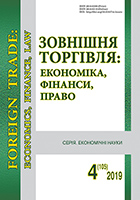Rating in assessing the competitiveness of higher education institutions
DOI:
https://doi.org/10.31617/zt.knute.2019(105)08Keywords:
higher education institutions, rating, evaluation criteria, competitiveness of higher education institutions, internationalization, global educational spaceAbstract
Background. The diversity of interests of different groups of stakeholders in higher education institutions necessitates a comprehensive approach to assessing their competitiveness. One of the tools for its implementation is the use of integrated assessments and recognized competitiveness ratings.
The aim of the article is to form a holistic model of assessing the competitiveness of IHE in the coordinate system of national and international measurement indicators on the basis of the analysis of the principles of construction of the most famous modern world and national ratings.
Materials and methods. Methods of structural-logical analysis, comparison, generalization, statistical and other methods were used when conducting research.
Methodological and informational basis of the work are scientific works of domestic and foreign authors, materials of periodicals, Internet resources, current normative-legal acts in the field of higher education, public analytical information, etc.
Results. Ratings, which are becoming a powerful tool for competition in the global market of educational services, are an integral tool for the formation of the state’s reputation in the conditions of development of the knowledge society. Most of the countries in the world in their educational policy aim at ensuring a greater presence and high positions of national IHEs in the international competitiveness ratings.
The considered methods of rating formation and the results of universities in its show not so much the better or worse positions of Ukrainian IHEs as the systemic problems of Ukrainian higher education as a whole. National ratings, however, indicate that the level of education based on quantitative indicators is biased. At the same time, high ranking positions are not only a sign, but also an important incentive to increase the competitiveness of a higher education institution.
According to the logic of this approach, the competitiveness of higher education institutions should be ensured mainly in the following areas of activity: development of science; achievement of high level of qualification of graduates and their demand in the labor market; increasing academic mobility; increasing the proportion of foreign students.
Conclusion. The integration of Ukraine into the global space of higher education and science, the intensification of competition for intellectual resources obtaining, require innovative theoretical approaches, modernization of methods and practical tools in managing the competitiveness of higher education institutions.
References
Kurbatov, S. (2015). Teoretyko-metodologichni perspektyvy rozrobky mizhnarodnyh universytets'kyh rejtyngiv (Theoretical and methodological perspectives for the development of international university rankings ). Vyshha osvita Ukrai'ny – Higher education of Ukraine, 1, 34-39. Retrieved from http://nbuv.gov.ua/UJRN/vou_2015_1_6 [in Ukrainian].
Petrenko, L. A., Semko, V. V., & Jushkova D. A. (2018). Obg'runtuvannja metodyky pobudovy rejtyngu zakladiv vyshhoi' osvity dlja abiturijentiv ta robotodavciv [Substantiation of the methodology for rating higher education institutions for entrants and employers]. Strategija ekonomichnogo rozvytku Ukrai'ny – Economic Development Strategy of Ukraine, 42 [in Ukrainian].
Sandul, M. S. (2016). Metodyky ocinjuvannja mizhnarodnoi' konkurentospromozhnosti nacional'nyh system vyshhoi' osvity [Methods for assessing the international competitiveness of national higher education systems]. Naukovyj visnyk Uzhgorods'kogo nacional'nogo universytetu – Scientific herald of Uzhgorod National University, 8 (2), 83-87. Serija: Mizhnarodni ekonomichni vidnosyny ta svitove gospodarstvo [in Ukrainian].
Sljusarenko, O. M. (2015). Rozvytok najvyshhogo universytets'kogo potencialu v umovah globalizacii' [Development of the highest university potential in the conditions of globalization]. Kyi'v: Priorytety [in Ukrainian].
Antonjuk, L. L., & Sacyk, V. I. Koncepcii' mizhnarodnoi' konkurentospromozhnosti universytetiv [Concepts of international competitiveness of universities]. Retrieved from http://meim.kneu.edu.ua/get_file.Php [in Ukrainian].
Gorbenko, A. L. (2015). Rozvytok mizhnarodnoi' dijal'nosti universytetiv jak metod konkurentnoi' borot'by na svitovomu rynku [Development of international activity of universities as a method of competition in the world market]. Elektronne fahove vydannja «Global'ni ta nacional'ni problemy ekonomiky» – Electronic professional edition «Global and national problems of economy». (Is. 5). Traven' [in Ukrainian].
Gryn'kevych, O. S. (2018). Upravlinnja konkurentospromozhnistju vyshhoi' osvity v Ukrai'ni: instytucijnyj analiz i monitoryng [Managing Higher Education competitiveness in Ukraine: institutional analysis and monitoring]. L'viv: LNU imeni Ivana Franka [in Ukrainian].
Il'nyc'kyj, D. O. (2016). Global'na konkurencija v naukovo-osvitn'omu prostori [Global competition in the scientific and educational space]. Kyi'v: KNEU [in Ukrainian].
IREG Observatory on Academic Ranking and Excellence / International Ranking Expert Group (IREG). ireg-observatory.org. Retrieved from http://ireg-observatory.org/en/about-us [in English].
Academic Ranking of World Universities. www.shanghairanking.com. Retrieved from http://www.shanghairanking.com [in English].
QS World University Rankings. www.topuniversities.com. Retrieved from https://www.topuniversities.com [in English].
Times Higher Education. www.timeshighereducation.com. Retrieved from https://www.timeshighereducation.com [in English].
Ranking Web of Universities. webometrics.info. Retrieved from http://www.webometrics.info [in English].
Pro shvalennja Koncepcii' stvorennja systemy rejtyngovoi' ocinky regioniv, galuzej nacional'noi' ekonomiky, sub’jektiv gospodarjuvannja [Ordinance of the Cabinet of Ministers of Ukraine No. 208-r from April 1, 2004 On approving the Concept of creating a rating system for regions, national economic sectors and economic entities] [in Ukrainian].
Pro zatverdzhennja Polozhennja pro nacional'nu systemu rejtyngovogo ocinjuvannja dijal'nosti vyshhyh navchal'nyh zakladiv [Order of the Ministry of Education and Science of Ukraine from 20.12.2011 № 1475. On approval of the Regulations on the national system of rating assessment of activity of higher educational establishments] [in Ukrainian].
Centr mizhnarodnyh proektiv «Jevroosvita» [Center for International Projects «Euro education»]. www.euroosvita.net. Retrieved from http://www.euroosvita.net. [in Ukrainian].
Berlin Principles on Ranking of Higher Education Institutions. www.ihep.org. Retrieved from http://www.ihep.org/research/publications/berlin-principles-ranking-higher-education-institutions [in English].
SciVerse Scopus. www.elsevier.com. Retrieved from https://www.elsevier.com/solutions/scopus [in English].
Osvita.ua [Education.ua]. www.osvita.ua. Retrieved from https://www.osvita.ua [in Ukrainian].
Top-50 vuzov po ocenkam rabotodatelej. Fokus [Top-50 universities estimated by employers. Focus]. focus.ua. Retrieved from https://focus.ua/ratings/375870 [in Russian].
Bidiuk, A. (2016). Competitiveness of higher education establishments in the learning services market. Visnyk Kyi'v. nac. torg.-ekon. un-tu – Herald of the Kyiv National University of Trade and Economics, 6, 116-123 [in English].
Additional Files
Published
How to Cite
Issue
Section
License
Copyright (c) 2022 Foreign trade: Economics, Finance, Law

This work is licensed under a Creative Commons Attribution 4.0 International License.
This work is licensed under a Creative Commons Attribution 4.0 International (CC BY 4.0)







